小学六年级下册英语资料
六年级下册英语人教版重点词汇复习资料
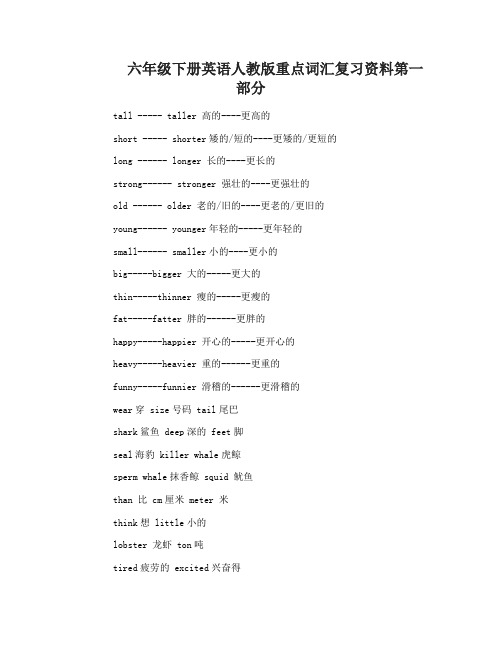
六年级下册英语人教版重点词汇复习资料第一部分tall ----- taller 高的----更高的short ----- shorter矮的/短的----更矮的/更短的long ------ longer 长的----更长的strong------ stronger 强壮的----更强壮的old ------ older 老的/旧的----更老的/更旧的young------ younger年轻的-----更年轻的small------ smaller小的----更小的big-----bigger 大的-----更大的thin-----thinner 瘦的-----更瘦的fat-----fatter 胖的------更胖的happy-----happier 开心的-----更开心的heavy-----heavier 重的------更重的funny-----funnier 滑稽的------更滑稽的wear穿 size号码 tail尾巴shark鲨鱼 deep深的 feet脚seal海豹 killer whale虎鲸sperm whale抹香鲸 squid 鱿鱼than 比 cm厘米 meter 米think想 little小的lobster 龙虾 ton吨tired疲劳的 excited兴奋得angry生气的 sad悲伤的happy高兴得 sore疼得hurt疼痛 bored无聊的feel感觉 sick有病的nose鼻子 know知道worry担心 medicine药drink喝 stay逗留better更好的 soon立刻;不久trip旅行 fail失败have a fever发烧 pass传递have a cold感冒have a sore throat喉咙痛have a toothache牙痛have a headache头痛六年级下册英语人教版重点词汇复习资料第二部分watch ( watched ) 看wash ( washed) 洗clean ( cleaned ) 打扫play (played ) 玩visit (visited)看望do/did 助动词/做cook (cooked ) 做饭go( went ) 去study ( studied ) 学习read ( read ) 阅读fly ( flew ) 飞yesterday ( 昨天)swim (swam) 游泳last 上一个weekend 周末to 朝 ,向park 公园go swimming ( went swimming ) 去游泳go fishing ( went fishing )去钓鱼go hiking ( went hiking ) 去郊游return ( returned) 送回/归还sing sang 唱 eat ate吃go went去 leave left离开take took 拍;照 have had有;吃buy bought买 see saw看见prepare准备 relax放松get got到达go/went ice-skating 去滑冰cousin 堂兄弟;堂姐妹工作I’ll= I will miss想念buy/bought presents 买礼物row/rowed a boat 划船see/saw elephants 看大象go/went skiing 去滑雪learn / learned Chinese学中文take /took pictures 拍照climb/climbed a mountain 爬山sing and dance /sang and danced 唱歌跳舞。
川教版六年级下册英语复习资料
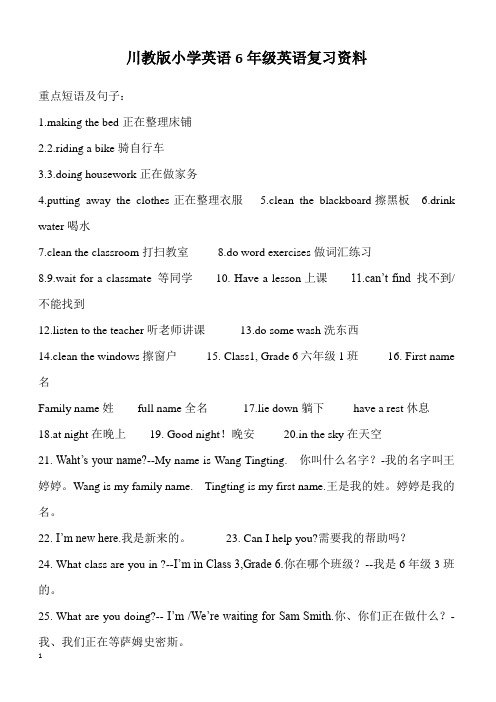
川教版小学英语6年级英语复习资料重点短语及句子:1.making the bed正在整理床铺2.2.riding a bike骑自行车3.3.doing housework正在做家务4.putting away the clothes正在整理衣服5.clean the blackboard擦黑板6.drink water喝水7.clean the classroom打扫教室8.do word exercises做词汇练习8.9.wait for a classmate 等同学10. Have a lesson上课11.can’t find 找不到/不能找到12.listen to the teacher听老师讲课13.do some wash洗东西14.clean the windows擦窗户15. Class1, Grade 6六年级1班16. First name 名Family name姓full name全名17.lie down躺下have a rest休息18.at night在晚上19. Good night!晚安20.in the sky在天空21.Waht’s your name?--My name is Wang Tingting. 你叫什么名字?-我的名字叫王婷婷。
Wang is my family name. Tingting is my first name.王是我的姓。
婷婷是我的名。
22.I’m new here.我是新来的。
23. Can I help you?需要我的帮助吗?24.What class are you in ?--I’m in Class 3,Grade 6.你在哪个班级?--我是6年级3班的。
25.What are you doing?-- I’m /We’re waiting for Sam Smith.你、你们正在做什么?-我、我们正在等萨姆史密斯。
教科版英语六年级下册全册复习资料
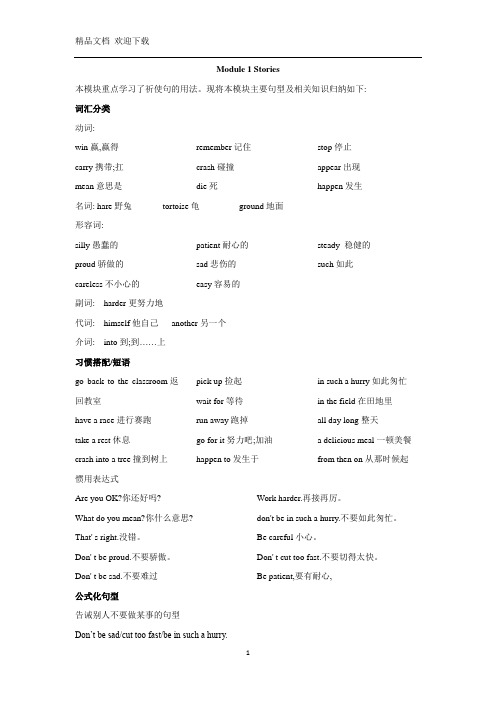
Module 1 Stories本模块重点学习了祈使句的用法。
现将本模块主要句型及相关知识归纳如下: 词汇分类动词:win赢,赢得carry携带;扛mean意思是remember记住crash碰撞die死stop停止appear出现happen发生名词: hare野兔tortoise龟ground地面形容词:silly愚蠢的proud骄做的careless不小心的patient耐心的sad悲伤的easy容易的steady 稳健的such如此副词: harder更努力地代词: himself他自己another另一个介词: into到;到……上习惯搭配/短语go back to the classroom返回教室have a race进行赛跑take a rest休息crash into a tree撞到树上pick up捡起wait for等待run away跑掉go for it努力吧;加油happen to发生于in such a hurry如此匆忙in the field在田地里all day long整天a delicious meal一顿美餐from then on从那时候起惯用表达式Are you OK?你还好吗?What do you mean?你什么意思? That' s right.没错。
Don' t be proud.不要骄傲。
Don' t be sad.不要难过Work harder.再接再厉。
don't be in such a hurry.不要如此匆忙。
Be careful小心。
Don' t cut too fast.不要切得太快。
Be patient,要有耐心,公式化句型告诫别人不要做某事的句型Don’t be sad/cut too fast/be in such a hurry.Be型祈使句Be careful/patient/steady.Module 2 Animals本模块重点学习了如何描述动物的特征、生活习性,号召我们保护处于危险中的动物。
小学英语6年级下册湘少版知识点汇总

小学英语6年级下册湘少版知识点汇总一、be (not) good at doing sth. (不)擅长做某事You’re good at drawing, Peter. 你擅长画画,皮特。
动名词表爱好:swimming 游泳jumping 跳跃playing table tennis 打乒乓球fishing 钓鱼drawing 画画二、want to do sth. (想要做某事)Anne wanted to skate. 安想要滑冰。
Anne wanted to learn skating. 安想要学滑冰。
Anne wanted to try again. 安想要再试一次。
动词原型:mend clothes 缝衣服read books 读书clean car 洗车fly kites 放风筝play computer games 玩电脑游戏三、look(s) like (看起来像。
)Our earth looks like this from space. 从太空看,我们的地球看起来像这样。
It looks like the sky. 它看起来像天空一样。
四、be interested in sth. (对。
感兴趣)Peter was very interested in the film. 皮特对这部电影很感兴趣。
五、What can I do? 我能做什么?(请求帮助)------I feel sick. What can I do? 我生病了。
我能做什么?------Go and see a doctor. 去看医生。
六、形容词用法(二)1、enough一词两用a.enough(形容词:足够的) + 名词------Have you got enough money? 你有足够的钱吗?------Yes, I have. / No, I haven’t. 是,我有。
/ 不,我没有。
b.形容词+ enough(副词:够…)It is useful enough. 它够用。
人教版六年级英语下册各单元必背词汇和句型
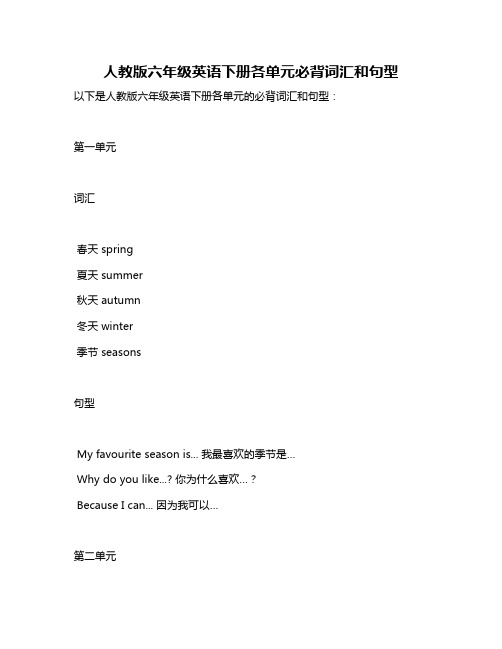
人教版六年级英语下册各单元必背词汇和句型以下是人教版六年级英语下册各单元的必背词汇和句型:第一单元词汇春天 spring夏天 summer秋天 autumn冬天 winter季节 seasons句型My favourite season is... 我最喜欢的季节是…Why do you like...? 你为什么喜欢…?Because I can... 因为我可以…第二单元词汇游泳 swim滑冰 skate放风筝 fly a kite堆雪人 make a snowman季节活动 seasonal activities句型What do you do in the...? 你在…做什么?I usually... 我通常…Do you often...? 你经常…吗?Yes, I do. / No, I don’t. 是的,我经常。
/ 不,我不经常。
第三单元词汇星期一 Monday星期二 Tuesday星期三 Wednesday星期四 Thursday星期五 Friday星期六 Saturday星期日 Sunday星期 weekdays星期天 weekends句型What do you have on...? 你星期几有什么课?I have... 我星期几有…课。
When do you have...? 你什么时候有…课? I have... on... 我在星期几有…课。
第四单元词汇电影 movies公园 parks图书馆 libraries博物馆 museums商店 shops饭店 restaurants医院 hospitals学校 schools银行 banks邮局 post offices公共场所 public places 句型。
小学英语六年级下册专题复习——名词(课件)
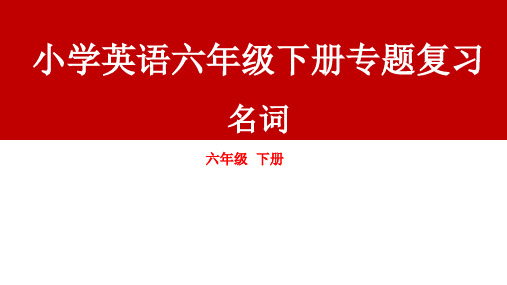
“ ’s ” “’”
“ ’s ” “’”
You can draw a mindmap in your way.
YOUR LOGO
I WIAH I LIVED HERE
Homework 1.完善思维导图。 2.完成同步课课练。
YOUR LOGO
I WIAH I LIVED HERE
Goodbye!
man__________
Let's check
desks buses familyies days knikvnesife
gigrilrsl wawtachtcehs partiyes keys leavfes
YOUR LOGO
I WIAH I LIVED HERE
Let's check
potatoes photos Chinese mmeann chchilidldren
小学英语六年级下册专题复习
名词
六年级 下册
仕版奋扬学校:何浇桐 霞石善祥学校:李淑铭,黎乐仪
名词专题
Watch and answer
1.Who went shopping?
YOUR LOGO
I WIAH I LIVED HERE
2.What did they buy in the supermarket?
the boy’s legs
the pens of Mr Jones
Mr Jones' pens
the keys of the men
the men’s
keys
the songs of the teachers
the teachers' songs
Hooray!
苏教版六年级下册英语必背知识点
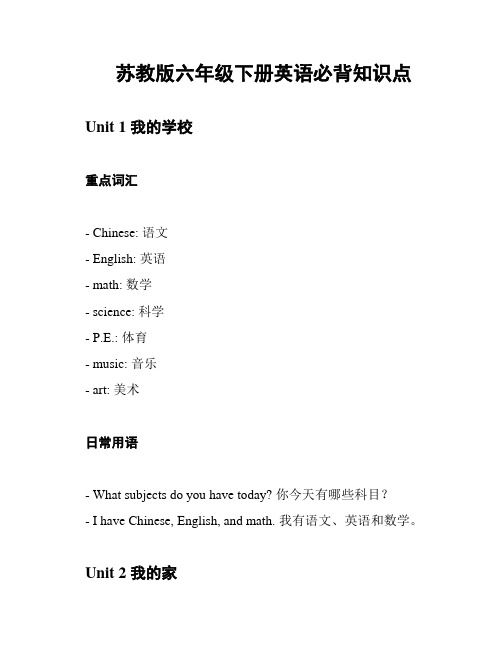
苏教版六年级下册英语必背知识点Unit 1 我的学校重点词汇- Chinese: 语文- English: 英语- math: 数学- science: 科学- P.E.: 体育- music: 音乐- art: 美术日常用语- What subjects do you have today? 你今天有哪些科目?- I have Chinese, English, and math. 我有语文、英语和数学。
Unit 2 我的家重点词汇- father: 父亲- mother: 母亲- parents: 父母- sister: 姐妹- brother: 兄弟- grandfather: 爷爷- grandmother: 奶奶- uncle: 叔叔- aunt: 阿姨- cousin: 表兄弟姐妹日常用语- This is my family photo. 这是我的家庭照片。
- Who’s this? 这是谁?- She’s my mother/He’s my father/They are my parents. 她/他/他们是我的父母。
Unit 3 好惯重点词汇- early: 早的- late: 迟的- brush: 刷- teeth: 牙齿- wash: 洗- hands: 手- face: 脸- have breakfast: 吃早餐- have lunch: 吃午餐- have supper: 吃晚餐日常用语- What time do you get up? 你几点起床?- I get up at six o'clock. 我六点钟起床。
- What do you do in the morning? 你早上做什么?- I brush my teeth and wash my face. 我刷牙洗脸。
Unit 4 日常安排重点词汇- do homework: 做家庭作业- read books: 看书- watch TV: 看电视- play sports: 做运动- take a walk: 散步- go shopping: 购物日常用语- What do you do after school? 放学后你干什么?- I do my homework, read books and play sports. 我做家庭作业、看书和做运动。
新北京课改版六年级下册小学英语全册单元知识点小结

新北京课改版六年级下册小学英语全册单元知识点小结Unit一、核心词汇What Are You Looking For?"1.名词:ground。
cup。
desk。
police。
head。
street。
garden2.动词:use。
worry3.形容词:worried。
purple。
wide。
little。
beautiful4.疑问代词:whose5.副词:only二、拓展词汇1.名词:bear。
colour。
pen。
maths。
homework。
man。
uncle。
XXX。
mountain。
earth。
winter。
summer。
basket2.动词:find。
mind。
ask。
borrow。
call。
guess。
remove。
grow3.形容词:big。
e。
young。
foolish。
wise。
XXX4.代词:they5.副词:there。
XXX6.介词:on。
without。
for7.短语:water bottle。
paper cup。
pencil case。
look for。
on the top of三、核心句型1."What are you looking for。
Sara?" "I'm looking for my water bottle。
I can't find it."This XXX continuous tense。
used to ask what someone is doing.XXX: "What are you doing here?" "I'm waiting for my sister."2."What's it like?"This XXX interrogative sentence using "what" to ask what something looks like.XXX: "What's your handbag like?"1."It's green," she said。
六年级下册英语知识点复习总结

六年级下册英语知识点复习总结六年级下册英语知识点复习总结在平平淡淡的学习中,大家最不陌生的就是知识点吧!知识点也可以理解为考试时会涉及到的知识,也就是大纲的分支。
哪些知识点能够真正帮助到我们呢?以下是店铺为大家整理的六年级下册英语知识点复习总结,欢迎阅读,希望大家能够喜欢。
小学六年级下册英语知识点:第三单元四会单词:watch—watched 看wash—washed 洗clean—cleaned打扫play—played玩 visit—visited 看望do—did last weekend上一个周末 go—went去go to a park—went to a park 去公园go swimming—went swimming去游泳go fishing—went fishing去钓鱼read—read 读go hiking—went hiking 去郊游四会句型:What did you do last weekend? 你上个周末干什么了?I played football. 我踢足球了。
Did you read books? 你读书了吗?Yes, I did.是的,我读了。
No, I didn’t. 不,我没有。
应该掌握的知识点:1、关于一般过去时一般过去时态:表示过去某一时间所发生的动作或存在的状态。
谓语动词要用一般过去式。
经常与yesterday(昨天), last week(上周), last month(上个月), last year(去年), two months ago(两个月前), the day before yesterday(前天),in 1990 (在1990年), in those days (在那些日子里)等表示过去的时间状语连用。
如: I was born in 1990. (我出生在1990年)。
When did you go to the park? (你是什么时候去的公园)。
六年级英语下复习资料
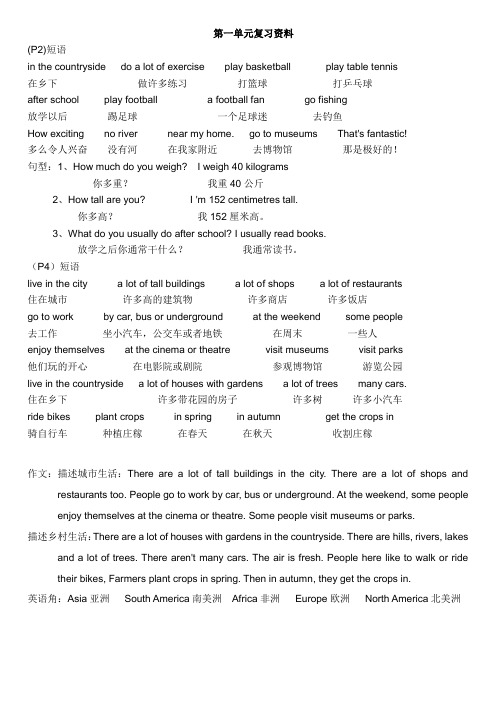
第一单元复习资料(P2)短语in the countryside do a lot of exercise play basketball play table tennis在乡下做许多练习打篮球打乒乓球after school play football a football fan go fishing放学以后踢足球一个足球迷去钓鱼How exciting no river near my home. go to museums That's fantastic!多么令人兴奋没有河在我家附近去博物馆那是极好的!句型:1、How much do you weigh? I weigh 40 kilograms你多重?我重40公斤2、How tall are you? I 'm 152 centimetres tall.你多高?我152厘米高。
3、What do you usually do after school? I usually read books.放学之后你通常干什么?我通常读书。
(P4)短语live in the city a lot of tall buildings a lot of shops a lot of restaurants住在城市许多高的建筑物许多商店许多饭店go to work by car, bus or underground at the weekend some people去工作坐小汽车,公交车或者地铁在周末一些人enjoy themselves at the cinema or theatre visit museums visit parks他们玩的开心在电影院或剧院参观博物馆游览公园live in the countryside a lot of houses with gardens a lot of trees many cars.住在乡下许多带花园的房子许多树许多小汽车ride bikes plant crops in spring in autumn get the crops in骑自行车种植庄稼在春天在秋天收割庄稼作文:描述城市生活:There are a lot of tall buildings in the city. There are a lot of shops and restaurants too. People go to work by car, bus or underground. At the weekend, some people enjoy themselves at the cinema or theatre. Some people visit museums or parks.描述乡村生活:There are a lot of houses with gardens in the countryside. There are hills, rivers, lakes and a lot of trees. There aren't many cars. The air is fresh. People here like to walk or ride their bikes, Farmers plant crops in spring. Then in autumn, they get the crops in.英语角:Asia亚洲South America南美洲Africa非洲Europe欧洲North America北美洲第二单元复习资料P8短语:in the past use a pen and paper to write books by hand use a machine在过去用笔和纸写书用手使用机器uses a computer. use film to take photos sweep the streets with a broom使用电脑用胶卷去照相打扫街道用扫帚use a digital camera see photos right away drive a street sweeper使用数码相机看照片立刻驾驶扫地机器人clean the streets in a short time打扫街道很快P10短语:once upon a time a poor farmer live in a small house would like to从前一个贫穷的农民住在一个小房子里愿意,喜欢three wishes smile at each other some gold have to work a happy life三个愿望互相微笑一些金子不得不工作快乐的生活P12短语:wash clothes by hand use a washing machine write letters write emails 用手洗衣服用洗衣机写信写邮件watch black and white TV watch colour TV看黑白电视看彩色电视句型:In the past, people……..Now people …….在过去,人们….. 现在人们…第三单元复习资料P14短语:in the future write down on a piece of paper time box have a picnic在将来写在一张纸上时间盒子野餐in the garden carry some books grow a lot of plants on a small computer在花园里拿一些书种许多的植物在一台小电脑上study online the head teacher在线学习校长P16短语:under the sea on high mountains in space help某人+动词原形other countries 在海底在高山上在太空帮助某人做某事其他国家in the library do other things all our lessons see dinosaurs在图书馆做其他的事情我们所有的课看见恐龙other interesting things have lessons do a lot of things carry books其他有趣的东西上课做许多事情拿书P18:have a swimming pool have a lot of club have chess cooking lessons用一个游泳池有许多俱乐部下棋厨艺课have a lot of books and magazines in our library around the playground在我们的图书馆里有许多书和杂志在操场周围句型:What changes would you like to see in your school?你喜欢看到学校什么变化?第四单元复习资料P22:an art museum tell某人about 某事the one on the left the one on the right一个美术博物馆告诉某人关于某事左边的那个右边的那个the night sky an oil painting look powerful a Chinese ink painting夜空一幅油画看起来有力量一幅中国水墨画作文:1、油画:I like the one on the left. It’s an oil painting.I like the colours. It’s colourful. The night sky isbeautiful.2、水墨画:I like the one on the righ t. It’s a Chinese ink painting. It’s usually in black and white. I likehorses. This horse looks powerful.P24:take drawing lessons in the first lesson ask某人to做某事on a plate上画画课在第一节课告诉某人去做某事在盘子上in the second lesson feel unhappy all the time look carefully在第二节课感到不开心一直仔细看look different work hard become a great artist看起来不同努力工作成为一名伟大的画家P26Which picture do you like? I like the one on the left.你喜欢那个图片?我喜欢左边的那个作文:1、This is a picture by Vincent van Gogh. The name of the picture is Sunflowers. In the picture,there are some yellow sunflowers in the vase. I like the picture because the sunflowers are beautiful.2、Leonardo da Vinci was a great artist. He painted the Mona Lisa.第五单元复习资料P28短语:make presents for make a crown a pair of scissors sound nice 为…做礼物做皇冠一把剪刀听起来不错little cousin want to be a princess a model house make a toy plane 小表弟/表妹想要成为公主模型房子做玩具飞机句型:What do you want to make? I want to make a ….你想要做什么?我想做一个…What do you need? I need….你需要什么?我需要….P30短语:a long time ago at work on a mountain such a small leaf很久以前在忙在山上如此小的叶子hurt my finger on the leaf a tool with teeth cut things say to himself 弄伤我的手指在叶子上带齿的工具割东西他自言自语make a saw the first saw in the world制作一把锯子第一把锯子在世界上第六单元复习资料P34短语:two PE lessons at school every week run long races want to win 两节体育课在学校每星期跑长跑想要赢do the long jump be good at play ball games run short races play sports 跳远擅长玩球类游戏跑短跑做运动do the high jump a lot of fun跳高许多乐趣P36短语:a swimming lesson a swimming cap a pair of swimming goggles too big一节游泳课游泳帽一副游泳眼镜太大get into your eyes wash yourself go into the swimming pool too small 进入你的眼睛洗澡进入游泳池太小do warm-up exercises after swimming go into the water做热身运动游泳之后入水stay healthy and fit enjoy your swimming lessons保持健康和健壮享受你的游泳课P39:The Olympic symbol is five rings in five colours: blue, black, red, yellow and green.奥林匹克五环有五种颜色:蓝,黑,红,黄和绿(P37)go swimming去游泳how to swim如何游泳句型1:----What do you need for swimming?游泳需要什么?----We need a swimsuit, a swimming cap and a pair of swimming goggles.我们需要一件泳衣,一个泳帽和一副游泳眼镜。
小学六年级下册英语词汇(Unit1~Unit2)
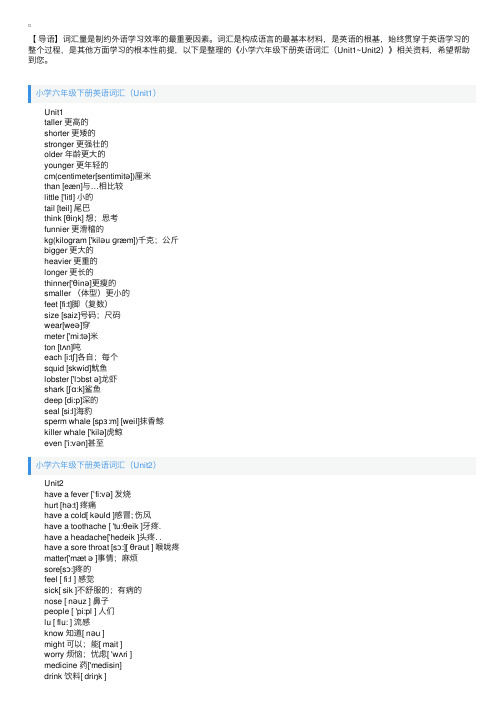
【导语】词汇量是制约外语学习效率的最重要因素。
词汇是构成语⾔的最基本材料,是英语的根基,始终贯穿于英语学习的整个过程,是其他⽅⾯学习的根本性前提,以下是整理的《⼩学六年级下册英语词汇(Unit1~Unit2)》相关资料,希望帮助到您。
⼩学六年级下册英语词汇(Unit1) Unit1 taller 更⾼的 shorter 更矮的 stronger 更强壮的 older 年龄更⼤的 younger 更年轻的 cm(centimeter[sentimitə])厘⽶ than [eæn]与…相⽐较 little ['litl] ⼩的 tail [teil] 尾巴 think [θiŋk] 想;思考 funnier 更滑稽的 kg(kilogram ['kiləu ɡræm])千克;公⽄ bigger 更⼤的 heavier 更重的 longer 更长的 thinner['θinə]更瘦的 smaller (体型)更⼩的 feet [fi:t]脚(复数) size [saiz]号码;尺码 wear[weə]穿 meter ['mi:tə]⽶ ton [tʌn]吨 each [i:tʃ]各⾃;每个 squid [skwid]鱿鱼 lobster ['lɔbst ə]龙虾 shark [ʃɑ:k]鲨鱼 deep [di:p]深的 seal [si:l]海豹 sperm whale [spɜ:m] [weil]抹⾹鲸 killer whale ['kilə]虎鲸 even ['i:vən]甚⾄⼩学六年级下册英语词汇(Unit2) Unit2 have a fever [ˈfi:və] 发烧 hurt [hə:t] 疼痛 have a cold[ kəuld ]感冒; 伤风 have a toothache [ 'tu:θeik ]⽛疼. have a headache['hedeik ]头疼. . have a sore throat [sɔ:][ θrəut ] 喉咙疼 matter['mæt ə ]事情;⿇烦 sore[sɔ:]疼的 feel [ fi:l ] 感觉 sick[ sik ]不舒服的;有病的 nose [ nəuz ] ⿐⼦ people [ 'pi:pl ] ⼈们 lu [ flu: ] 流感 know 知道[ nəu ] might 可以;能[ mait ] worry 烦恼;忧虑[ 'wʌri ] medicine 药['medisin] drink 饮料[ driŋk ] stay 在; 逗留[ stei ] better 更好的[ 'betə ] soon[ su:n ]⽴刻;不久 tired 疲劳的;累的[ taird ] excited 兴奋的[ ik'saitid ] angry['æŋgri]⽣⽓的;愤怒的 happy['hæpi]⾼兴的 bored[ bɒ:d ]⽆聊的;烦⼈的 sad[ sæd ]忧愁的;悲伤的 trip 旅⾏[ trip ] fail 不及格;失败[ feil ] test 测试[ test ] hear[ hiə ]听见;听到 match ⽐赛[ mæt ʃ ] between 在…之间[ bi'twi:n ] pass 传递[ pɑ:s ] kick 踢[ kik ] a little[ 'litl ]有些 goal[ gəul ]得分数 bounce[bauns]反弹 off[ ɒ:f ]距;离;离开 another[ ə'n ʌeə ]另⼀个 guess[ ges ] 猜测 win[ win ](过去式won [wʌn])赢 game ⽐赛;游戏[ geim ] laugh at[ lɑ:f ] [ æt ]因…⽽发笑。
2020新人教版(PEP)小学英语六年级下册各单元知识点总结
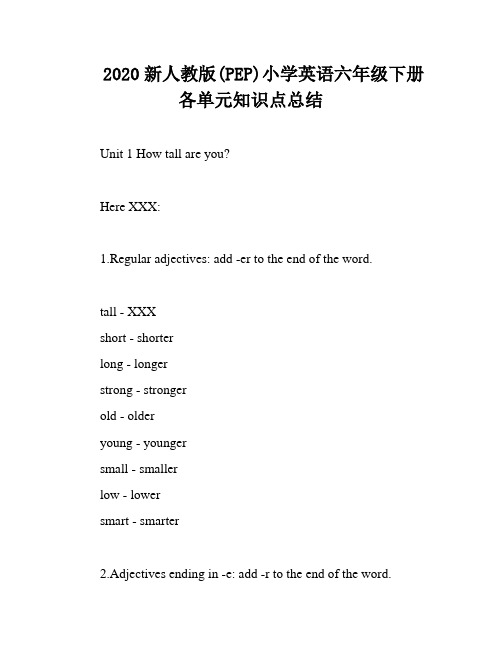
2020新人教版(PEP)小学英语六年级下册各单元知识点总结Unit 1 How tall are you?Here XXX:1.Regular adjectives: add -er to the end of the word.tall - XXXshort - shorterlong - longerstrong - strongerold - olderyoung - youngersmall - smallerlow - lowersmart - smarter2.Adjectives ending in -e: add -r to the end of the word.large - largerlate - latersimple - simplersafe - safer3.Adjectives XXX: double the final consonant and add -er.big - biggerXXX - XXXfat - fattersad - sadderhot - hotterwet - wetter4.Adjectives ending in -y: change the -y to -i and add -er.happy - happierheavy - XXXXXX - funnierangry - angrierXXX - XXXwindy - windierbusy - busierearly - earlierXXX:dinosaur。
hall。
than。
both。
meter。
kilogram。
size。
feet。
wear。
countryside。
shadow。
e.Here XXX:1.Asking about age。
height。
weight。
etc.How old are you?How tall are you?How heavy are you?I am (age) years old。
六年级英语下学期(PEP人教版)全册单元知识点复习资料
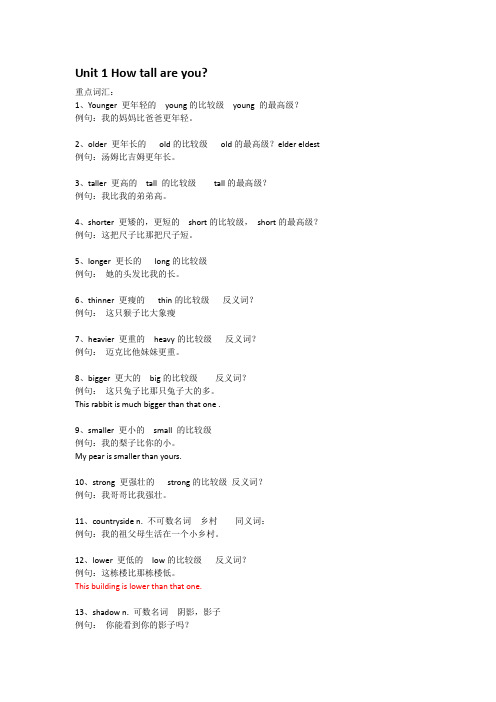
Unit 1 How tall are you?重点词汇:1、Younger 更年轻的young的比较级young 的最高级?例句:我的妈妈比爸爸更年轻。
2、older 更年长的old的比较级old的最高级?elder eldest 例句:汤姆比吉姆更年长。
3、taller 更高的tall 的比较级tall的最高级?例句:我比我的弟弟高。
4、shorter 更矮的,更短的short的比较级,short的最高级?例句:这把尺子比那把尺子短。
5、longer 更长的long的比较级例句:她的头发比我的长。
6、thinner 更瘦的thin的比较级反义词?例句:这只猴子比大象瘦7、heavier 更重的heavy的比较级反义词?例句:迈克比他妹妹更重。
8、bigger 更大的big的比较级反义词?例句:这只兔子比那只兔子大的多。
This rabbit is much bigger than that one .9、smaller 更小的small 的比较级例句:我的梨子比你的小。
My pear is smaller than yours.10、strong 更强壮的strong的比较级反义词?例句:我哥哥比我强壮。
11、countryside n. 不可数名词乡村同义词:例句:我的祖父母生活在一个小乡村。
12、lower 更低的low的比较级反义词?例句:这栋楼比那栋楼低。
This building is lower than that one.13、shadow n. 可数名词阴影,影子例句:你能看到你的影子吗?14、smarter 更聪明的smart的比较级例句:你变得越来越聪明了。
You are getting smarter and smarter.15、become v. 开始变得,变成例句:这个女孩想成为一名演员。
This girl wants to become an actress.重点短语:How tall 多高how heavy 多重how old 多大what size 多大号In this hall 在这个厅里both of 两个都over there 在那边have a look 看一看Go down 下降重点句型:①形容词的最高级:最高级通常用于3人或者3人以上的人或事物之间的比较。
小学英语人教精通版六年级下册重点归纳

小学英语人教精通版六年级下册重点归纳第一单元Unit1 I went to Sanya for my holidays.重点单词:Sun 太阳moon月亮star星星Learn 学习;学到word 单词;词blackboard黑板say 说subject学科but 但是yesterday昨天why 为什么use用重点短语:1.by plane 乘飞机2.at night 在晚上3.at home 在家里4.a lot of 很多5.go to the beach 去沙滩6.do tasks 做任务7.act in drama 表演戏剧8.stay at home 待在家里9.have a party 聚会10.enjoy Spring Festive 过春节11.listen to music 听音乐12.speak English 讲英语13.read English 读英语14.write E n glish 写英语15.talk in English n用英语交谈16.play in English 用英语玩游戏17.enjoy sunbathing享受日光浴18.have an English party举办英语聚会19.enjoy the moon and stars看月亮和醒醒20.learn from each other 互相学习。
重点句型:1. We have learned a lot of English words我. 们学了很多英语单词。
2. We learned from each other我. 们互相学习。
2.What did you do for your holidays?你假期做了什么?3.I went to Sanya.我去了三亚。
4.We are very interested in English我. 们对英语很感兴趣。
5.How did you learn English?你(们)是怎么学英语的?6.We learned English by doing things我. 们通过做事情来学英语。
六年级英文下册复习资料
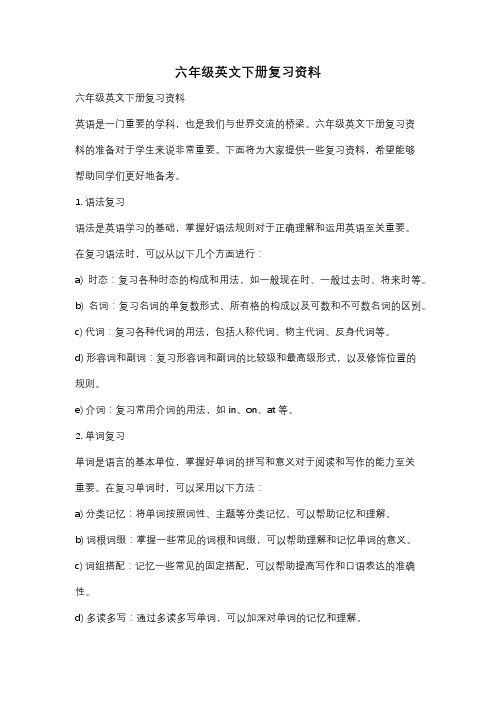
六年级英文下册复习资料六年级英文下册复习资料英语是一门重要的学科,也是我们与世界交流的桥梁。
六年级英文下册复习资料的准备对于学生来说非常重要。
下面将为大家提供一些复习资料,希望能够帮助同学们更好地备考。
1. 语法复习语法是英语学习的基础,掌握好语法规则对于正确理解和运用英语至关重要。
在复习语法时,可以从以下几个方面进行:a) 时态:复习各种时态的构成和用法,如一般现在时、一般过去时、将来时等。
b) 名词:复习名词的单复数形式、所有格的构成以及可数和不可数名词的区别。
c) 代词:复习各种代词的用法,包括人称代词、物主代词、反身代词等。
d) 形容词和副词:复习形容词和副词的比较级和最高级形式,以及修饰位置的规则。
e) 介词:复习常用介词的用法,如in、on、at等。
2. 单词复习单词是语言的基本单位,掌握好单词的拼写和意义对于阅读和写作的能力至关重要。
在复习单词时,可以采用以下方法:a) 分类记忆:将单词按照词性、主题等分类记忆,可以帮助记忆和理解。
b) 词根词缀:掌握一些常见的词根和词缀,可以帮助理解和记忆单词的意义。
c) 词组搭配:记忆一些常见的固定搭配,可以帮助提高写作和口语表达的准确性。
d) 多读多写:通过多读多写单词,可以加深对单词的记忆和理解。
3. 阅读理解阅读理解是考察学生对文章内容理解和推理能力的重要部分。
在复习阅读理解时,可以从以下几个方面进行:a) 主旨理解:抓住文章的主旨和中心思想,帮助理解文章的整体意义。
b) 细节理解:注意细节信息的捕捉和理解,帮助回答具体问题。
c) 推理能力:通过对文章内容的推理,进行判断和推断。
d) 词义猜测:根据上下文的提示,猜测生词的意义。
4. 口语表达口语表达是英语学习的重要组成部分,通过练习口语可以提高听说能力和自信心。
在复习口语表达时,可以从以下几个方面进行:a) 日常交际用语:复习一些常用的日常交际用语,如问候、道歉、感谢等。
b) 对话练习:模拟真实情景进行对话练习,如购物、预订餐厅等。
牛津小学英语六年级下册知识点总结(词组+句型)
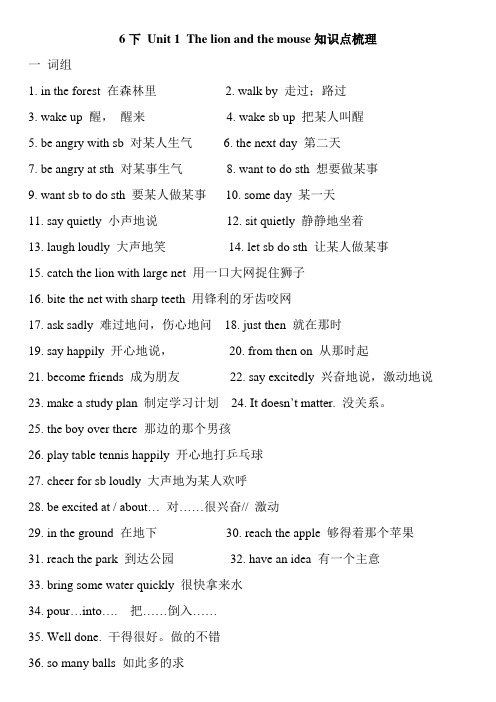
6下Unit 1 The lion and the mouse知识点梳理一词组1. in the forest 在森林里2. walk by 走过;路过3. wake up 醒,醒来4. wake sb up 把某人叫醒5. be angry with sb 对某人生气6. the next day 第二天7. be angry at sth 对某事生气8. want to do sth 想要做某事9. want sb to do sth 要某人做某事10. some day 某一天11. say quietly 小声地说 12. sit quietly 静静地坐着13. laugh loudly 大声地笑14. let sb do sth 让某人做某事15. catch the lion with large net 用一口大网捉住狮子16. bite the net with sharp teeth 用锋利的牙齿咬网17. ask sadly 难过地问,伤心地问18. just then 就在那时19. say happily 开心地说,20. from then on 从那时起21. become friends 成为朋友22. say excitedly 兴奋地说,激动地说23. make a study plan 制定学习计划24. It doesn’t matter. 没关系。
25. the boy over there 那边的那个男孩26. play table tennis happily 开心地打乒乓球27. cheer for sb loudly 大声地为某人欢呼28. be excited at / about… 对……很兴奋// 激动29. in the ground 在地下 30. reach the apple 够得着那个苹果31. reach the park 到达公园32. have an idea 有一个主意33. bring some water quickly 很快拿来水34. pour…into….把……倒入……35. Well done. 干得很好。
部编版六年级英语下册英语复习资料

部编版六年级英语下册英语复习资料一、词汇复1. 动物- cat: 猫- dog: 狗- horse: 马- elephant: 大象- bird: 鸟2. 食物- apple: 苹果- banana: 香蕉- rice: 米饭- bread: 面包- milk: 牛奶3. 数字- one: 一- two: 二- three: 三- four: 四- five: 五二、语法复1. 时态- 一般现在时:用来描述经常性的动作或客观事实。
例如:I go to school every day.(我每天去学校。
)- 一般过去时:用来描述过去发生的动作或状态。
例如:She played with her friends yesterday.(她昨天和她的朋友们玩。
)2. 名词单数和复数- 名词单数变复数一般在词尾加-s。
例如:dog(单数)- dogs (复数)- 以-s,-x,-ch,-sh结尾的名词单数变复数一般在词尾加-es。
例如:box(单数)- boxes(复数)三、阅读理解阅读材料1Hello, my name is Tom. I am ten years old. I have a pet dog named Max. Max is very playful and loves to go for walks with me. We have a lot of fun together.1. What is the name of the pet dog?A. MaxB. TomC. TimmyD. John2. How old is Tom?A. Eight years oldB. Ten years oldC. Twelve years oldD. Fifteen years old阅读材料2Here is a recipe for banana bread. It's easy to make and delicious!Ingredients:- 2 ripe bananas- 1 cup flour- 1/2 cup sugar- 1/4 cup butter- 1 teaspoon baking powderInstructions:1. Peel the bananas and mash them in a bowl.2. In a separate bowl, mix the flour, sugar, and baking powder.3. Melt the butter and add it to the dry ingredients.5. Preheat the oven to 350°F (180°C).6. Grease a loaf pan and pour the batter into it.7. Bake for 45-50 minutes.8. Let it cool before slicing and serving.3. How many bananas are needed for the recipe?A. 1B. 2C. 3D. 44. What is the baking temperature for the banana bread?A. 250°F (121°C)B. 350°F (180°C)C. 450°F (232°C)D. 550°F (288°C)四、写作练请根据以下提示写一段话,描述你的家乡。
- 1、下载文档前请自行甄别文档内容的完整性,平台不提供额外的编辑、内容补充、找答案等附加服务。
- 2、"仅部分预览"的文档,不可在线预览部分如存在完整性等问题,可反馈申请退款(可完整预览的文档不适用该条件!)。
- 3、如文档侵犯您的权益,请联系客服反馈,我们会尽快为您处理(人工客服工作时间:9:00-18:30)。
一、动词词组
go swimming 去游泳
go skating 去滑冰
play basketball 打篮球play football 踢足球play baseball 打棒球play ping-pong 打乒乓球go boating 去划船
do morning exercises 做早操
go to the zoo 去动物园
go to the park 去公园
go to the supermaket 去超市
go to school 去学校
go home 回家
walk to school 走路去学校
play the piano 弹钢琴
play the trumpet 吹小号
play the guitar 弹吉他
read a book 看书
write a letter 写信
send an e-mail 发送邮件
do my homework 写作业
play games 玩游戏
play the computer 玩电脑
play chess 下象棋
fly a kite 放风筝
go shopping 去购物
climb the mountain 爬山
ride a horse 骑马
ride a bike 骑自行车
listen to the music 听音乐
sing a song 唱歌
watch TV 看电视
watch a football game 观看
足球比赛
play cards 玩牌
go to bed 去睡觉
take a taxi 搭乘的士
get up 起床
make a card 制作卡片
make a cake 制作蛋糕
have an icecream 吃冰淇淋
have dinner 吃晚餐
have lunch 吃中餐
have breakfast 吃早餐
二、主要时态:
一般过去时:表示过去某个时间里发生的动作或状态。
yesterday
many years ago /ten years ago(一段时间+ago)
last week/last weekend/last night/last year
规则变化:1.直接加ed:work—— worked
2.以e结尾的单词,直接加d:live ——lived arrive----arrived
3 以辅音字母+y结尾的,变y为i加ed:study—— studied
4.以重读闭音节结尾的,双写最后的辅音字母+ed:stop——
stopped
不规则变化:is/am-was are-were buy——bought drink——drank eat——ate have——had learn——learnt make——made
see——saw ride——rode give----gave tell----told
go---went win---won draw---drew
become---became spend---spent fly—flew
1.一般句子
肯定句:I watched TV last night. (我昨晚看电视。
)
He was a driver.(他曾是一名司机)
否定句:I didn't go home yesterday. (我昨天没回家。
)
注意:didn’t 后面用动词原形
2. there be 句型
There was an apple on the table last night.
There weren
3. 一般疑问句
Did you watch TV last night? 肯定回答:Yes, I did.
否定回答:No, I didn't. Did he/she watch TV last night?
肯定回答:Yes, he/she did.
否定回答:No,he/she didn't.
4.特殊疑问句
What did you do last night?(昨晚你做什么?)
When did you go home last night?(昨晚你什么时候回家?)
Where did you go last night?(昨晚你去哪里?)
一般现在时:表示通常性、规律性、习惯性的状态或者动作
当主语是第三人称单数时:(he/she/it/my sister/Sam)
(1)肯定句She likes cats./He goes to shool everyday./My mum sings everyday.
(2)否定句She doesn't like cats.
(3)一般疑问句Does she like cats?
肯定回答Yes,she does.否定回答No,she doesn't.
一般将来时:表示将来某一时刻的动作或状态
tomorrow(明天),next week(下周),soon(不久后)
1.一般句子
I am going to go to the zoo. (我打算去动物。
)
You are going to go to the park.(你打算去公园)
He is going to go swimming.(他打算去游泳。
)
She is going to go shopping. (她打算去购物。
)
We are going to have a picnic.(我们打算去野餐。
)
They are going to go to school.(他们打算去学校。
)
It’s going to rain/snow.(准备要下雨了/下雪了。
)
It’s going to be sunny/cloudy/warm/hot/cold/cool/windy.(准备是晴朗的/多云的/暖和的/酷热的/寒冷的/凉爽的/刮风的天气了。
)
注意:be going to 后面用动词原形
2.特殊疑问句
What are you going to do?(你准备要去做什么?)
When are we going to eat ?(我们什么时候去吃东西?)
Where is she going to go?(她准备要去哪里?)
现在进行时:表示现在或当前一段时间正在进行的动作。
1.一般直接+ ing sleep—sleeping jump--jumping
2.去掉不发音的e,再加ing make—making take—taking shine—shining dance-dancing have—having
3.重读闭音节,且末尾只有1个辅音字母(m,n,p,t),双写辅音字母(m,n,p,t),再加ing swim--swimming sit—sitting run --running
1.一般句子
I am looking out of window. (我正往窗外看。
)
You are eating dinner.(你正在吃晚餐)
He is playing the trumpet.(他正在吹小号。
)
She is watching TV. (她正在看电视。
)
We are dancing.(我们正在跳舞。
)
They are having a birthday party.(他们正在参加生日派对。
)
The doorbell is ringing.(这个门铃正在响。
)
2.特殊疑问句
What are you doing?(你正在做什么?)
----I am making Daming’s birthday card.
Why are you wearing a raincoat?(为什么你穿着雨衣?)
---Because it’s going to rain.
三、常用问句:
What time is it? (几点钟了?)How much is it?(多少钱?)
What colour is it?(它是什么颜色?)How old are you?(你多大了?)问地点where(哪里)
问时间when (什么时候)问人物who (谁)
问什么东西|what(什么)问为什么why (为什么)
四、常用日常会话
It looks good..(它看起很好。
)
Here you are.(给你。
)
Enjoy your meal.(尽情享用。
)
Can I help you?(有什么可以帮助你?)Who can help me?(谁能帮助我?)。
